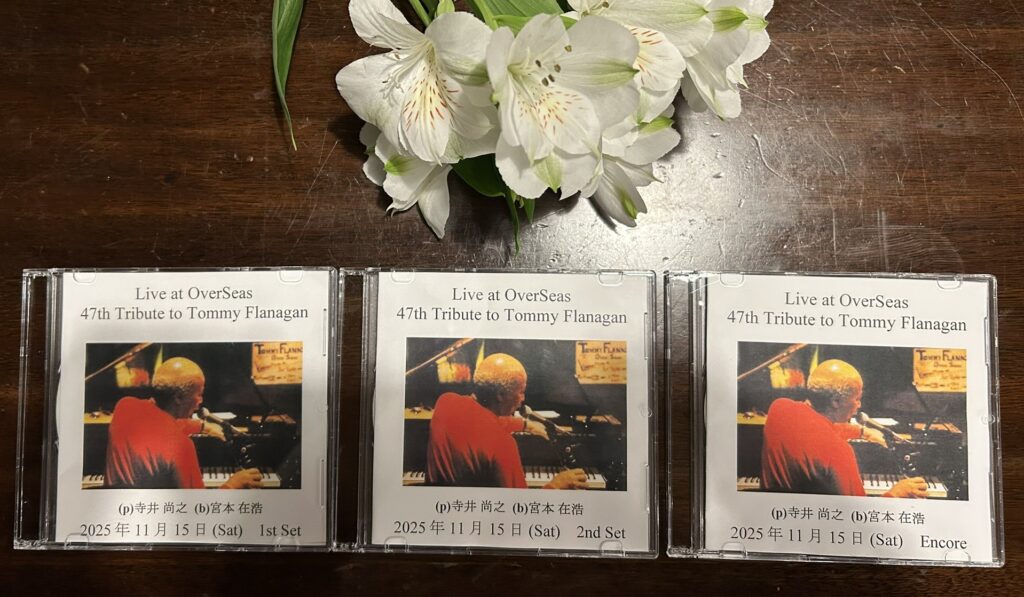
第47回トミー・フラナガン追悼コンサートのCDができました。
ぜひお聴きください!
寺井尚之
*お申し込みは当店まで。
演奏:寺井尚之(p)+宮本在浩(b)デュオ
*演奏曲:https://x.gd/6IKUn
*演奏曲解説:https://x.gd/VJ4Ch
ライブ・イベント情報と日々の出来事

第47回トミー・フラナガン追悼コンサートのCDができました。
ぜひお聴きください!
寺井尚之
*お申し込みは当店まで。
演奏:寺井尚之(p)+宮本在浩(b)デュオ
*演奏曲:https://x.gd/6IKUn
*演奏曲解説:https://x.gd/VJ4Ch

(Go to English Edition )
演奏:寺井尚之-piano、宮本在浩-bass
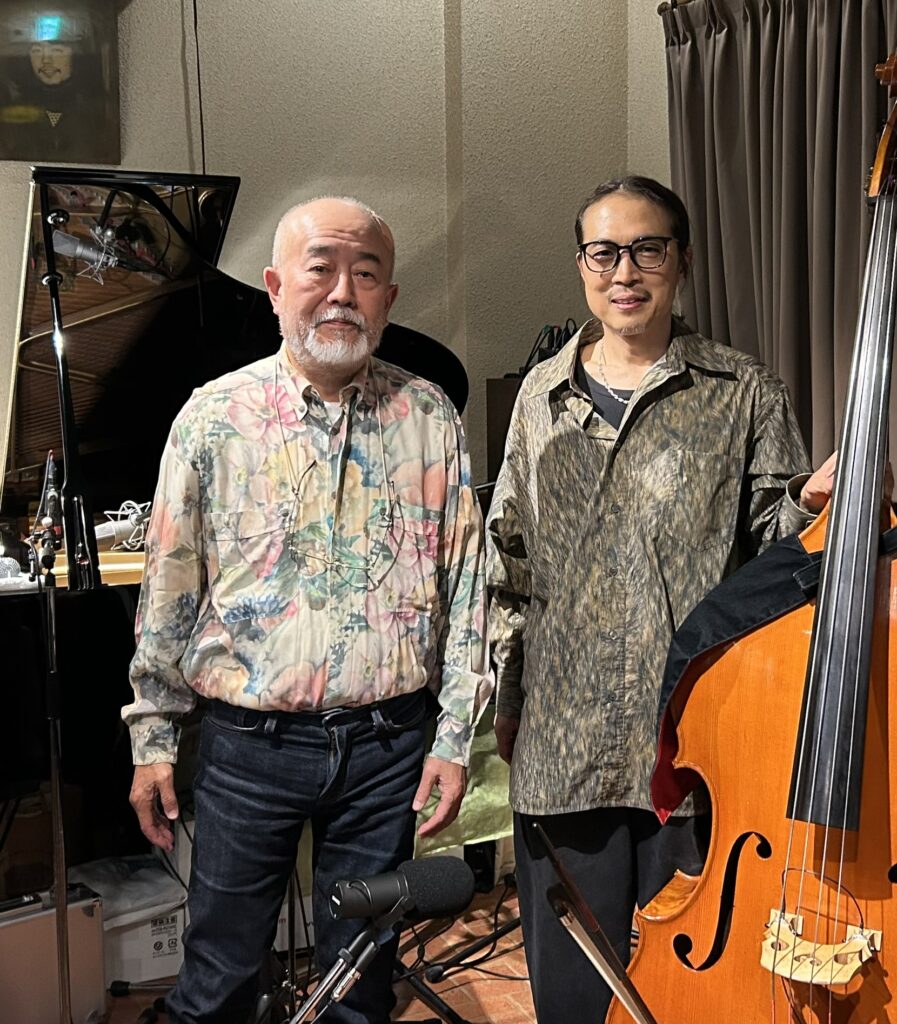
1. Epistrophy (Thelonious Monk)
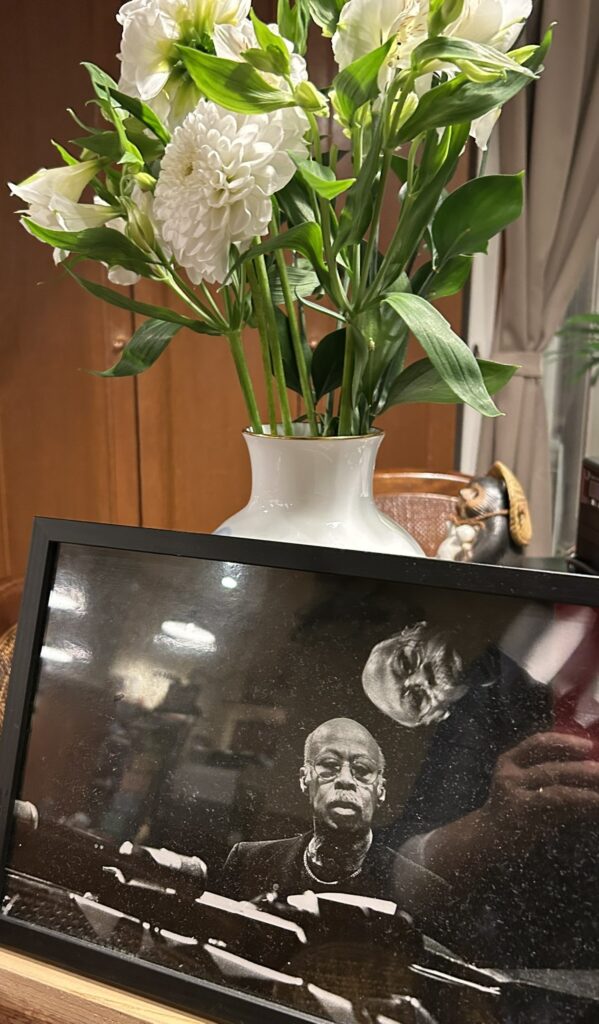
〈エピストロフィー〉 コンサートの始まりは、元来、セロニアス・モンクがライヴの終わりにチェッサーとして使ったオリジナル曲。寺井尚之にとって、トミー・フラナガンがOverSeasで演奏してくれた圧巻のヴァージョンが今も記憶に残っている。
2. Beyond the Blue Bird (Tommy Flanagan)
〈ビヨンド・ザ・ブルーバード〉 《ブルーバード》はデトロイトの黒人居住地にあったジャズ・クラブ(ブルーバード・イン)のことで、20代のフラナガンが、サド・ジョーンズ率いるハウスバンドの一員として毎夜演奏していた。その時代への郷愁が漂うブルージーな曲。デトロイト・ハードバップは、このクラブで開花し、フラナガンにとって理想のジャズクラブだった。
3. Medley: Embraceable You (George Gershwin)
~Quasimodo(Charlie Parker)
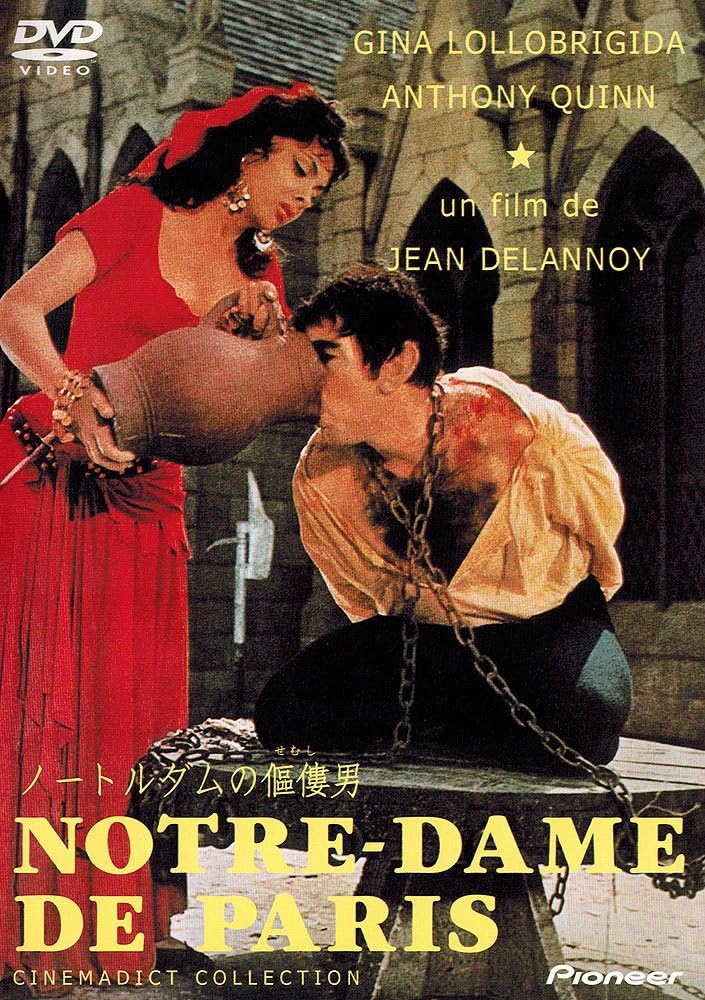
〈メドレー:エンブレイサブル・ユー~カジモド〉 ライヴでトミー・フラナガンが披露するさまざまなメドレーの素晴らしさは定評があったものの、著作権コストの問題から、歴史的に貴重なロング・メドレーは録音がなく、せめてトリビュートで在りし日の雄姿を偲びたい。
これは、”抱きしめたくなるほど愛らしいあなた”というガーシュイン作の原曲と、それを基にチャーリー・パーカーが作曲し、醜いノートルダムの鐘つき男”カジモド”と名付けたバップ・チューンという異例の組み合わせ。キーの変化につれストーリーが進み、「愛らしさ」と「醜さ」の境界線が変わっていく。パーカーはなぜ「抱きしめたいほど素敵な恋人」に「醜いせむし男」をかぶせたのか?それは単なるジョークではない。本当の美が肌の色や外見でなく、魂に宿るという主張だということを、フラナガンの演奏解釈が明瞭に説明してくれている。
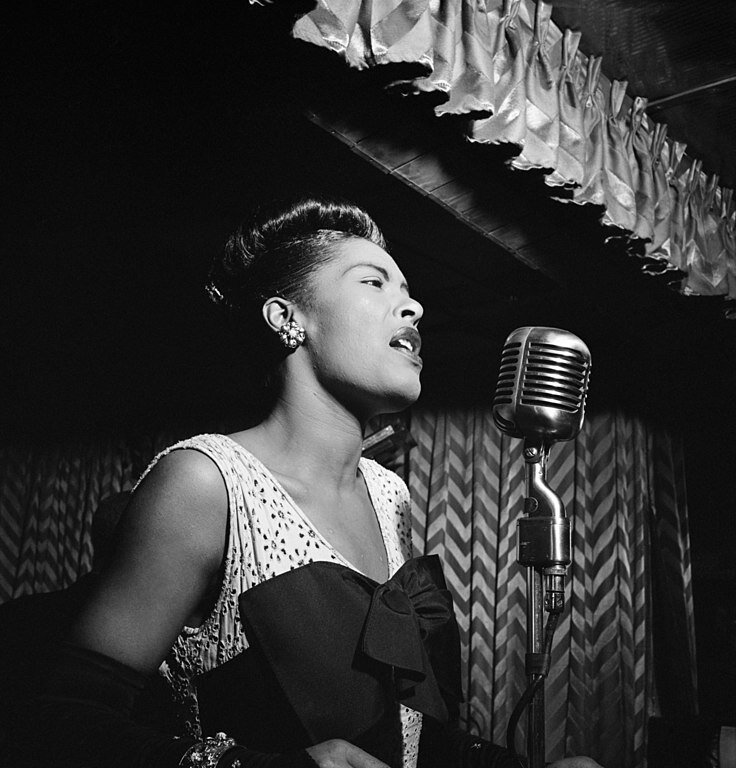
4. Good Morning Heartache (Irene Higginbotham)
〈グッドモーニング・ハートエイク〉 フラナガンのアイドルであり、音楽的にも大きな影響をうけた不世出の歌手ビリー・ホリディ(写真)のヒット曲(’46)。 トミー・フラナガンの歌心の秘密はここにあり、寺井もホリディを聴くよう、口を酸っぱくして言われた。それから数十年、寺井の演奏するホリディにも、ひっそり語り掛けるような恋のエッセンスが宿る。
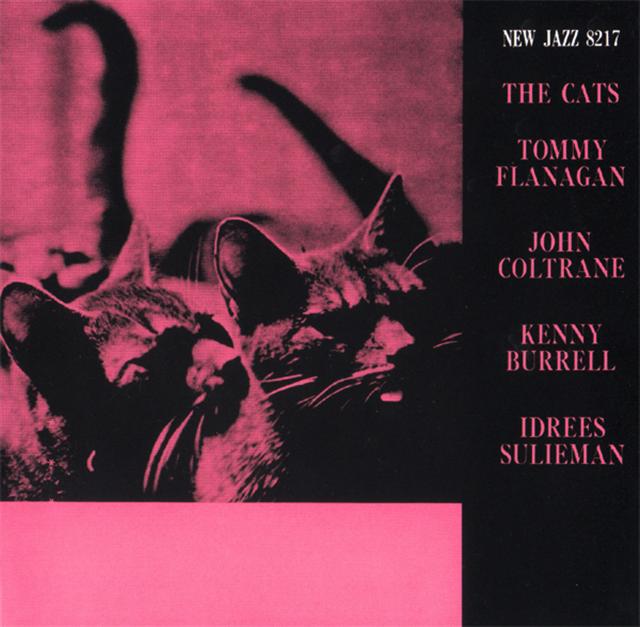
5. Minor Mishap (Tommy Flanagan)
〈マイナー・ミスハップ〉人気盤『The Cats』で初演されたフラナガンのオリジナル。他のメンバーにとっては初見で、たったワンテイク録りだったという。その演奏内容のせいでMinor Mishap(ささやかなアクシデント)という曲名がついたのかもしれない。以来フラナガンは、初演をリヴェンジするかのように長年愛奏し、強烈なデトロイト・ハードバップの魅力を発散させた。 寺井尚之の名演目でもある。

6. Dalarna (Tommy Flanagan)
〈ダーラナ〉J.J.ジョンソン・クインテットのスウエーデン・ツアー中に録音された初期の代表作『Overseas』に収録されたオリジナル。ダーラナ地方は、森と湖が美しいスウェーデン屈指のリゾート地、ピアノの生徒会長からいただいた名産品の木馬が今夜のピアノにちょこんと鎮座していた。
当時のフラナガンが心酔した印象派音楽とビリー・ストレイホーンの影響が感じられると同時に、厳しい転調をさりげなく用いて洗練された美を生み出すフラナガン独特の作風が光る。
フラナガン自身は録音後、長年演奏することがなかったが、寺井尚之の同名CDに触発され、寺井のアレンジで『Sea Changes』(’96)に再録。その直後、フラナガンは寺井に「ダーラナを録音したぞ!」と電話で伝えてきた。その弾んだ声は、寺井の胸に今も響く。
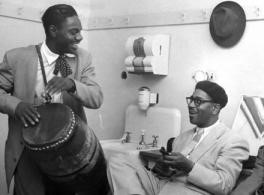
7. Tin Tin Deo (Chano Pozo, Gill Fuller Dizzy Gillespie)
〈ティン・ティン・デオ〉キューバ人コンガ奏者、チャノ・ポゾが口ずさむメロディとリズムを基に作られディジー・ガレスピー楽団がヒットさせたアフロ・キューバン・ジャズの代表曲。
ビッグバンドのマテリアルを、コンパクトなピアノ・トリオ編成で表現するのがフラナガン音楽の特徴で、哀愁に満ちたキューバの黒人音楽と、ビバップの洗練されたイディオムを見事に融合させたアレンジが素晴らしい。
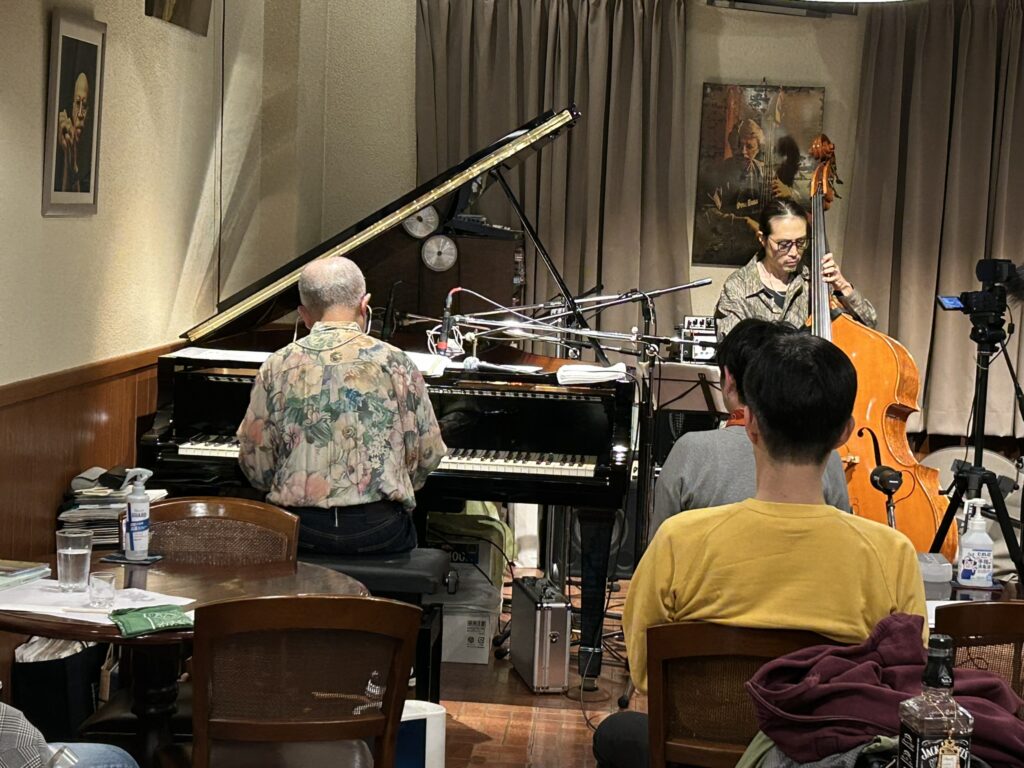
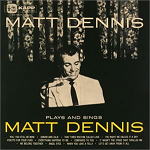
〈ザット・タイアード・ルーティーン・コールド・ラヴ〉作曲者マット・デニスは弾き語りの名手で〈エンジェル・アイズ〉はじめフランク・シナトラのヒットソングを数多く提供した。デニスならではの斬新なメロディとハーモニーは、ジャズ・ミュージシャンのチャレンジ精神を刺激する。「恋なんて、お決まりのワン・パターン、なのに君のような人に出会うと、またまた恋してしまう・・・」というユーモラスな歌詞に沿うメロディは、思わず口づさみたくなるけれど、実は転調が果てしなく続く難曲だ。フラナガンはJ.J.ジョンソン・クインテット時代に初演、’80年代後半から自己レパートリーに加え『Jazz Poet』 (’89)に収録。録音後もライヴで演奏するにつれ、アレンジがアップデートしていった。その進化型は寺井が引き継ぎ、このトリビュート・コンサートで楽しむことができる。
2. Smooth As the Wind (Tadd Dameron)
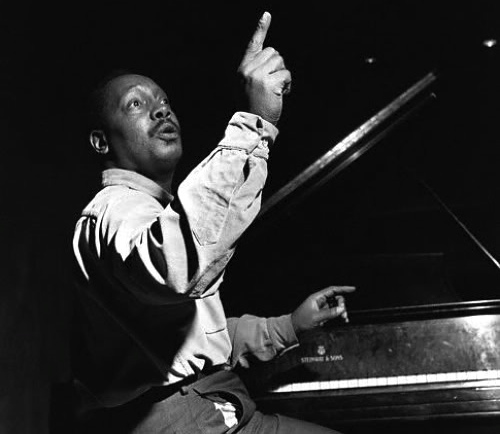
〈スムーズ・アズ・ザ・ウィンド〉フラナガンが愛奏したタッド・ダメロン(ピアニスト、作編曲家)の作品。力強く優美な「美バップ」の黄金比率を持ち、美しい花がつぎつぎ開花していくようなハーモニーの華麗さに目を見張る。
この曲は、麻薬刑務所服役中のダメロンがブルー・ミッチェル(tp)のアルバム「Smooth as the Wind」(Riverside, ’61)の為に書き下ろしたもので、録音にはフラナガンも参加している。
一編の詩のような曲の展開、吹き去る風のように余韻を残すエンディングまで、完成度の高いアレンジはレガシーとして残したい。
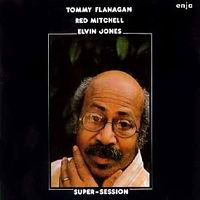
3. Rachel’s Rondo (Tommy Flanagan)
〈レイチェルのロンド〉フラナガンと最初の妻、アンとの間に生まれた美しい長女レイチェルに捧げたオリジナル曲。フラナガンは『Super Session』(’80)に収録したが、ライヴでは余り演奏しなかった。
一方、寺井はこの曲を大切にして長年愛奏し、『Flanagania』(’94)に収録。冴え渡るピアノのサウンドを活かした品格のあるナンバーとして人気がある。
4. If You Could See Me Now (Tadd Dameron)

〈イフ・ユー・クッド・シー・ミー・ナウ〉1946年、タッド・ダメロンが新進ヴォーカリストだったサラ・ヴォーンのために書き下ろしたバラード。フラナガンはダメロンを愛奏する理由を「オーケストラのサウンドが内蔵されているので弾きやすいから。」と語っている。1981年、カウント・ベイシー楽団とリメイク録音した際、サラが歌ったフレーズをセカンド・リフに用い、オーケストラの醍醐味を表出する。
フラナガン自身の録音が残っていないのは、寺井が師匠に先駆けて『Flanagania』にこの曲を収録したためで、現在も悔いが残る。
5. Eclypso (Tommy Flanagan)
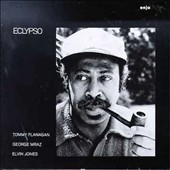
〈エクリプソ〉 フラナガンのオリジナルの中でも、最も人気のあるカリプソ・ムードの作品。寺井はこの曲の元になっているのはバド・パウエル作曲〈So Sorry Please〉だと看破する。フラナガンの招きで長期NY滞在した最後の夜、《ヴィレッジ・ヴァンガード》が出演するフラナガンが「ヒサユキのために」とスピーチして演奏してくれた思い出の曲。
6. I’ll Keep Loving You (Bud Powell)
〈アイル・キープ・ラヴィング・ユー〉甘さを抑えた静謐な硬派のバラードで、バド・パウエル(写真)が友人の歌手のために作った曲と言われている。
フラナガンがパウエル作品を演奏すると、曲の持ち味を失うことなく、一層洗練された美しさが醸し出された。トリビュート・コンサートではフラナガンに対する変わらぬ想いをこめて。
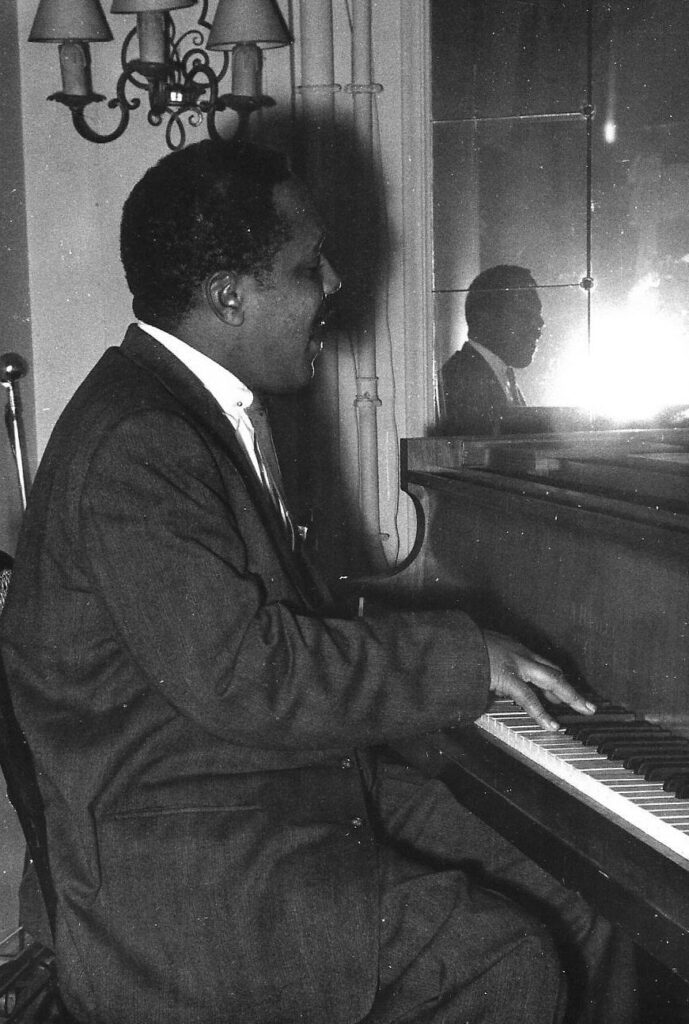
7. Our Delight (Tadd Dameron)
これもタッド・ダメロン作品で、フラナガンはライヴのラスト・チューンとして盛んに愛奏した。それにもかかわらず、レコーディングはハンク・ジョーンズやジャッキー・バイアードとのピアノ・デュオしか残されていない。現在、バップの醍醐味が炸裂するスリリングなフラナガンのアレンジを再現できるのは寺井だけだ。寺井と宮本在浩のプレイは、ドラムレスであることを忘れるほどダイナミックで素晴らしい。
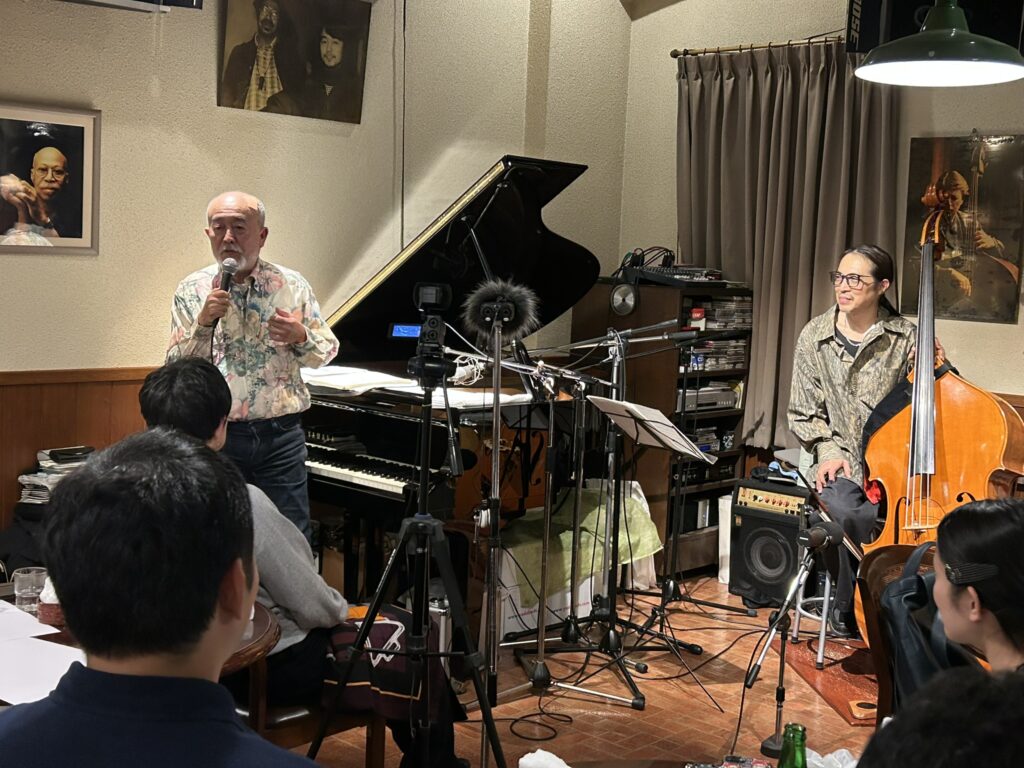
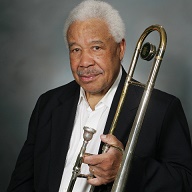
With Malice Toward None (Tom McIntosh)
〈ウィズ・マリス・トワード・ノン〉フラナガンと寺井に共通の十八番であり、OverSeasで最も人気のある曲。「With Malice Towards None(誰にも悪意を向けず)」という言葉は南北戦争後のエイブラハム・リンカーンの名言、メロディは讃美歌「主イエス我を愛す」が元になっていて、まさに今の世が求める曲といえるかもしれない。
トム・マッキントッシュ(写真)はこの曲の創作過程で、友人フラナガンのアドバイスをたくさん盛り込んだと語っている。そのせいか、マッキントッシュ自身やミルト・ジャクソンなどが残した録音の中でも、フラナガンのヴァージョンは、品格と感動の両面で点で傑出している。
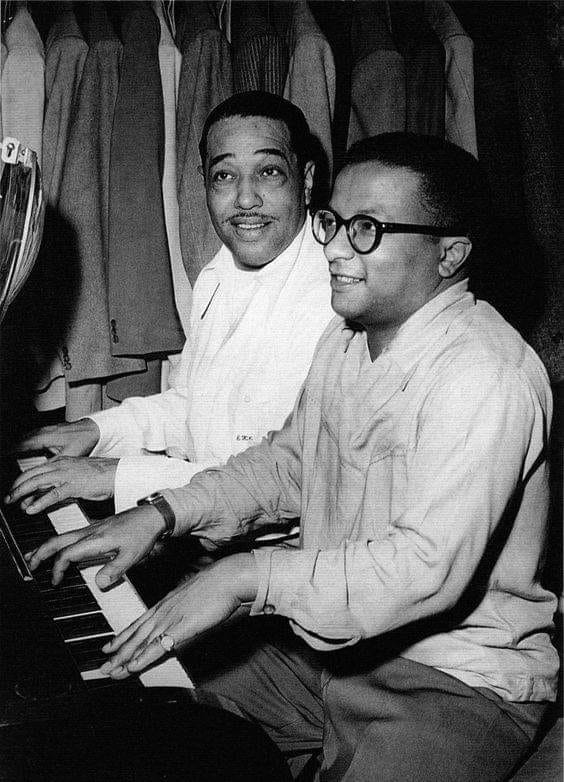
Chelsea Bridge (Billy Strayhorn)
〈チェルシーの橋〉デューク・エリントンのパートナー、ビリー・ストレイホーンによる幻想的な名曲であり、フラナガンは『Overseas』(’57)、『Tokyo Ricital』(’75)などに繰り返し録音した。晩年のフラナガンは「ビリー・ストレイホーン集」の録音企画を進めていたが、道半ばで亡くなってしまったことが残念でならない。
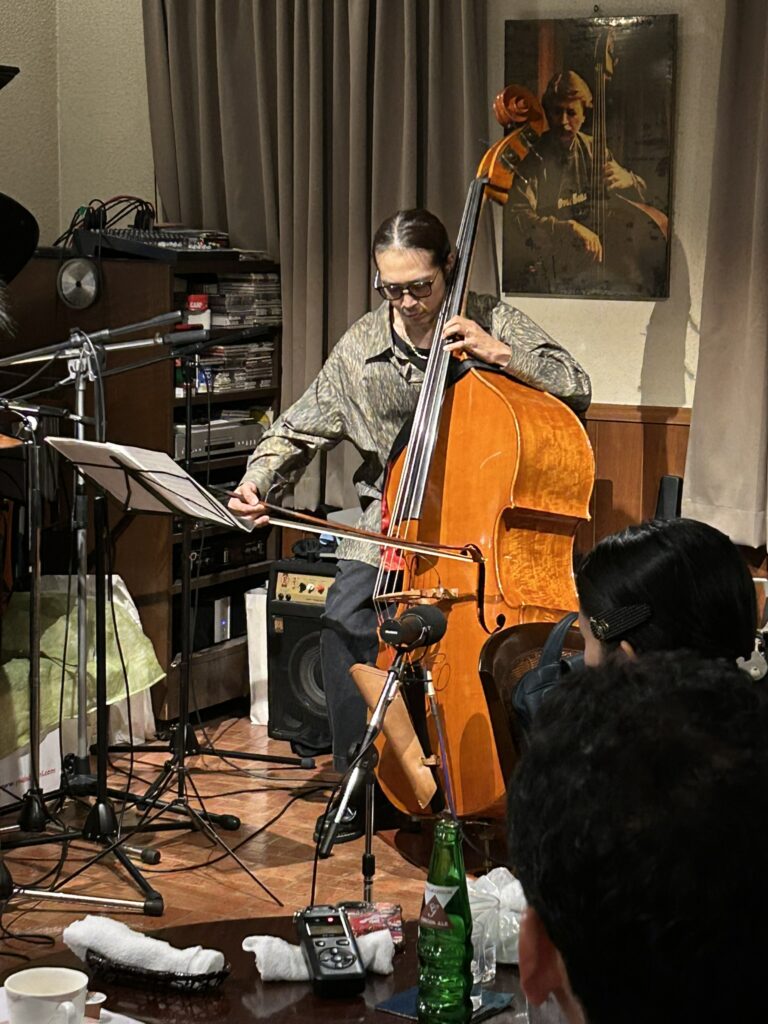
Passion Flower (Billy Strayhorn)
〈パッション・フラワー〉日本語にするなら「受難の花」というタイトルはストレイホーン自身のことかもしれない。フラナガン・トリオでは、ベーシスト、ジョージ・ムラーツのフィーチャー・ナンバーとして、ライヴで毎夜演奏された曲。今回のトリビュートでも、宮本在浩が弓の妙技で魅了した。ムラーツはフラナガン・トリオ退団後もこの曲を愛奏、リーダー作『My Foolish Heart(’95)』に収録した。
Black & Tan Fantasy (Duke Ellington)
〈黒と茶の幻想〉晩年のフラナガンは、自分が子供時代に親しんだ、ビバップ以前の楽曲を精力的に開拓していた。禁酒法時代に花開いた“ハーレム・ルネサンス運動”を象徴する場所、コットンクラブで人気を博した初期エリントン楽団の代表曲〈ブラック&タン・ファンタジー(黒と茶の幻想)〉(’27)はフラナガンが標榜したブラック・ミュージックの原点だ。
フラナガンが生前最後にOverSeasを訪問したとき、寺井がこの曲を演奏したとき、珍しく絶賛してくれた思い出の曲だ。
*47回目を迎えたトミー・フラナガン・トリビュート、今回も様々な場所からたくさんのお客様が駆けつけてくださって、在りし日のフラナガンの雄姿を偲ぶことができました。座席数に限りがあり、やむを得ずお断りした方々にお詫び申し上げます。
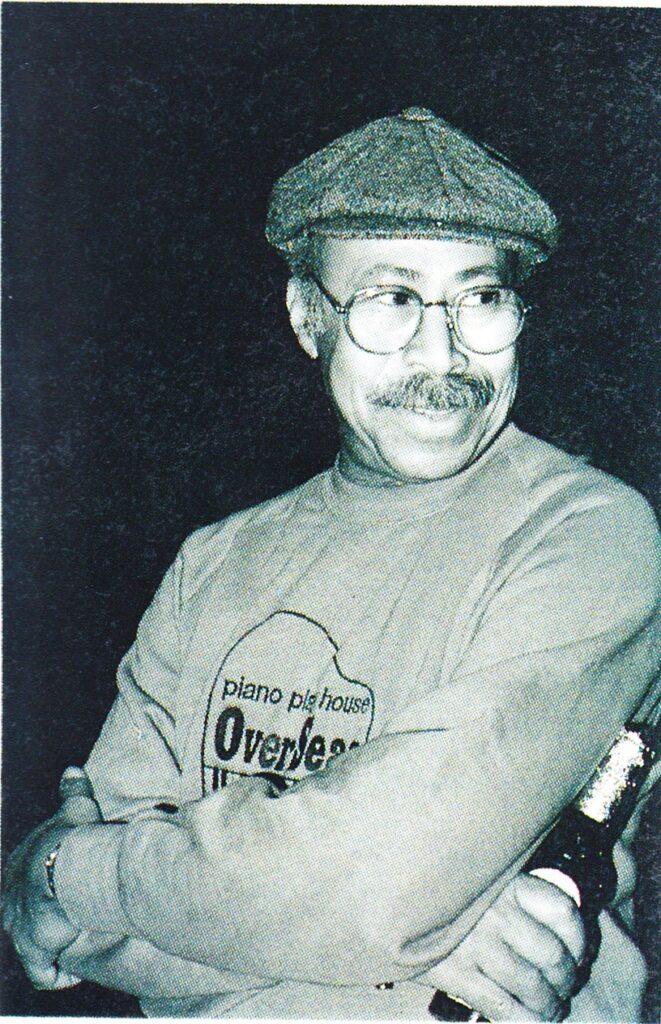
コンサート開催にあたって多くの応援とご支援を賜り心よりお礼申し上げます。また当日はかつてフラナガンも着用した懐かしいユニフォーム姿でお越しいただいたお客様にも感謝の心でいっぱいです。
寺井尚之+宮本在浩DUOのプレイには、一段とダイナミクスが加わって新しいフェーズに移行したことを実感しました。
OverSeasのピアノはトリビュート前になるとサウンドの輝きが増し妖気さえ感じるほど鳴りがよくなります。長年調律と調整をいただく川端定嗣氏にも感謝いたします。
次回はフラナガンの誕生月となる2026年3月にトリビュートを開催する予定です。皆様にまたフラナガンの音楽を楽しんでいただけるよう一同精進いたしますので、変わらぬご愛顧のほど宜しくお願い申し上げます。
Text: 寺井珠重

当日は混み合いますので、できれば6:30pmまでにご入場いただけると助かります。
なお、チケットは完売いたしました。従って当日券はございません。
どうぞ宜しくお願い申し上げます。
店主敬白
トリビュート・コンサートに先駆け、フラナガンの肉声が名盤や巨匠たちの思い出を語る貴重なインタビューの字幕版をUPしました。
元は、コロンビア大学 WKCR-FMで1990年に放送されたラジオ・インタビューをホストのサックス奏者、現在ジュリアード音楽院で教鞭をとるLoren Schoenberg(ローレン・ショーンバーグ)さんが編集し自身のYoutubeチャンネルにアップしたものです。
フラナガンの早口で独特の話し方は、生成字幕では変換が難しいため、ショーンバーグさんにお願いして字幕版を作成し、Jazz Club OverSeasチャンネルにアップしました。
動画の共有を許可してくださったショーンバーグさんのご厚意に心より感謝します。
(字幕作成:寺井珠重)

秋のトミー・フラナガン・トリビュートは11月15日(土)に開催します。![]() 第47回Tribute to Tommy Flanagan Concert
第47回Tribute to Tommy Flanagan Concert
日時:11月15日(土) 7pm-/8:20pm(開場6pm 入替なし)
前売りチケット¥3850(税込 座席指定)
席数が限られています。お早めにお求めください。
=Annual Concert tribute to Tommy Flanagan in November 2025=
This year of 2025, pianist and owner of Jazz Club OverSeas, Hisayuki Terai with Zaiko Miyamoto on bass will hold his special tribute concert to his mentor, Tommy Flanagan on the anniversary of his passing.
Date and Time:
Saturday, November 15, 2025
7:00 PM / 8:20 PM (Doors open at 6:00 PM, no seat change between shows)
Ticket in advance 3850JPY
English Program Note is here
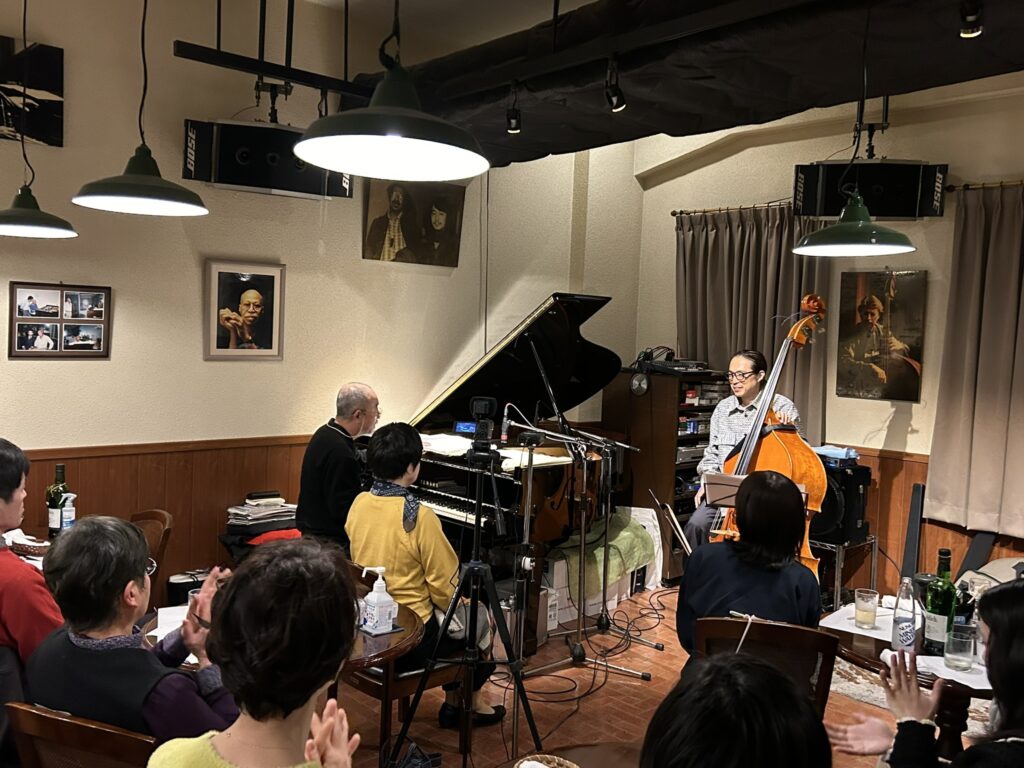
トミー・フラナガン没後24年、OverSeasで誕生月と逝去月に開催する46回目のトリビュート・コンサートを3月15日に開催しました。
フラナガンの名演目を選りすぐってお聴きいただくトリビュート・コンサート、今回はフラナガンが生涯愛奏しつづけ、自費で『Let’s (Play the Music of Thad Jones)』という作品集を録音しているサド・ジョーンズの作品にスポットを当てたコンサートになりました。
演奏は、おなじみフラナガン唯一の弟子、寺井尚之(p)と25年来のパートナー、宮本在浩(b)とのデュオ。
今回も各地から駆けつけた満員のフラナガン・ファンの皆様とトリビュート・コンサートを楽しむことができました。
1. 50-21 (Thad Jones)
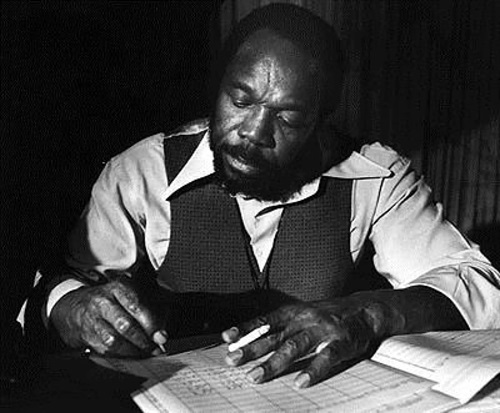
オープニングは、フラナガンが大きな影響を受けたコルネット奏者、作編曲家、サド・ジョーンズ(写真左)のオリジナル。デトロイト・ハードバップ誕生の地であるデトロイトの黒人居住地にあったジャズクラブ《ブルーバード・イン》に因んだ曲。50-21はクラブの番地(5021 Tireman Ave. Detroit)だ。フラナガンとジョーンズは、このクラブのハウスバンドとして活動(1953~54年)、その時期に演奏した多くのサド・ジョーンズ作品は、フラナガン終生の愛奏曲になる。コンサートの客席には、愛車ナンバーが“5021”の常連様が2名もおられるのが誇らしい。
フラナガンはアルバム《Comfirmation》 (Enja ’77) 、《Beyond the Blue Bird》 (Timeless, ’90) 、寺井尚之は《Fragrant Times》 (Flanagania ’97)に収録。
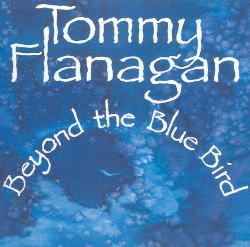
2, Beyond the Blue Bird (Tommy Flanagan)
ビヨンド・ザ・ブルーバード:フラナガンが《ブルーバード・イン》へのノスタルジーを込めて作った作品で、同じくデトロイトの盟友ギタリスト、ケニー・バレルをゲストに迎えたリーダー作(’90)のタイトル曲とした。
アルバムのリリース前、フラナガンはNYで寺井尚之にこの譜面を写譜させ、彼に演奏することを許した。めまぐるしい転調によって曲に品格と深みを出す典型的なフラナガン・ミュージックだ。
3. Medley: Embraceable You (George Gershwin) – Quasimodo (Charlie Parker)
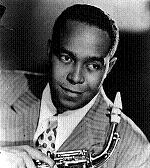
メドレー エンブレイサブル・ユー~カジモド:生前のフラナガンはライヴで数多くのメドレーを演奏したが、録音が残っているのはごく一部だ。これは、ガーシュインの「抱きしめたいほど愛らしいあなた」という意味のバラードと、その進行を基にチャーリー・パーカーが作曲し、醜い“ノートルダムの背むし男(カジモド)”の名を付けたビバップ曲の組み合わせだ。フラナガンはこの2曲を組み合わせることによって「魂の“美”は、表面的な美醜や肌の色とは無関係だ」というチャーリー・パーカーの芸術的真意を伝えた。寺井も同じ信念で演奏を続けている。
4. Minor Mishap (Tommy Flanagan)

マイナー・ミスハップ:フラナガンが終生愛奏した自作のハードバップ・チューンで、初リーダー作『Cats』 (’57)に収録。” minor mishap”は、「ちょっとしたアクシデント」という意味。名前の由来は『Cats』のレコーディングのほろ苦い顛末に由来する。。
フラナガンは昔気質のジャズ・ミュージシャンで、演奏するとき譜面を用いない流儀だったが、初めての共演者では、そうもいかず譜面が必要になる。そこで、来日時に、寺井の採譜した譜面をコピーして持ち帰っていた。フラナガンのサイン入りのMinor Mishapの譜面は当店の壁に飾られている。
5. Sunset and the Mockingbird (Duke Ellington, Billy Strayhorn)
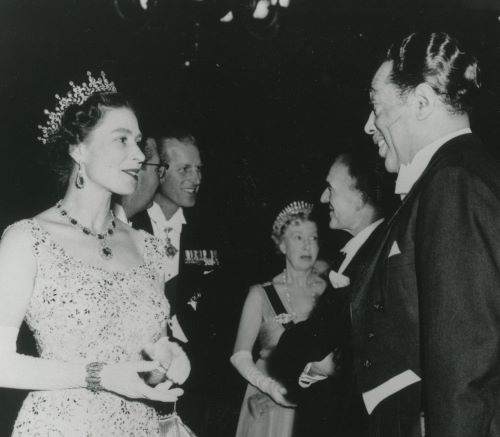
サンセット&ザ・モッキンバード:デューク・エリントンがフロリダ半島で聴いたモッキンバードの鳴き声に触発され瞬く間に書き上げ、エリザベス女王への献上品として、自費で1枚だけプレスしたアルバム『女王組曲』に収録した曲。
フラナガンならではのピアノ・タッチの妙技が堪能でき、フラナガン67才の『バースデー・コンサート』 (’97 Blue Note) のタイトル曲となっている。
6. Beats Up (Tommy Flanagan)
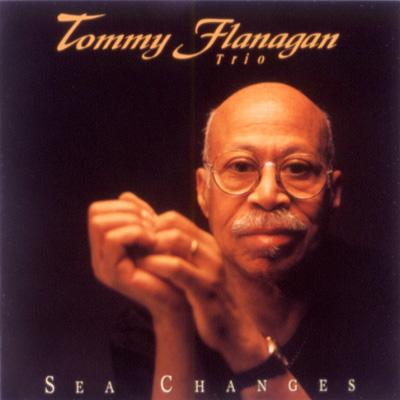
ビーツ・アップ:1957年『OVERSEAS』と、ほぼ40年後のリメイク盤『Sea Changes』 (’96 Alfa Jazz)に再録したリズム・チェンジのリフ・チューン。
元来、トリオ仕様の曲ながら、寺井尚之と宮本在浩とのデュオは、トリオに負けないダイナミックなプレイを聴かせる。
7. Dalarna (Tommy Flanagan)

ダーラナ:『OVERSEAS』に収録されたフラナガン初期の美しい作品、彼が少年期に没頭した印象派音楽や、ビリー・ストレイホーンの影響が感じられる。
『OVERSEAS』は、1957年、J.J.ジョンソンとの数か月にわたるスウェーデン・ツアーの合間に録音された。スウェーデン文化省の主催で、国の津々浦々まで演奏旅行を行ったJ.J.クインテットの音楽は、後のスウェーデン・ジャズに大きな影響を及ぼし、その縁で、寺井尚之はスウェーデンのジャズ・ミュージシャンと親交が厚い。
『Overseas』以降、長年演奏しなかったフラナガンだが、寺井尚之のCD『Dalarna』に触発され、寺井のアレンジを用いて『Sea Changes』(’96)に再録。演奏する寺井尚之の胸中には、「ダーラナを録音したぞ!」とNYから電話をかけてきたフラナガンの弾んだ声が響いている。
8. Tin Tin Deo (Chano Pozo, Gill Fuller, Dizzy Gillespie)

ティン・ティン・デオ:第一部のクロージングは、フラナガン屈指の名演目、ディジー・ガレスピーが牽引したアフロキューバン・ジャズの代表曲だ。
読み書きのできない天才的なキューバ人コンガ奏者、チャノ・ポゾが口ずさんだメロディとリズムをガレスピー達が採譜し、ビッグバンド用の曲に仕上げた。フラナガンは、曲独特の土臭さと哀愁を保ちながら、ビッグバンドに負けないダイナミクスに、持ち前の気品を加えたヴァージョンを創造した。
トリビュートでは、さらに切り詰めたデュオ編成で、寺井尚之と宮本在浩が、フラナガン的ダイナミズムを再現してみせる。
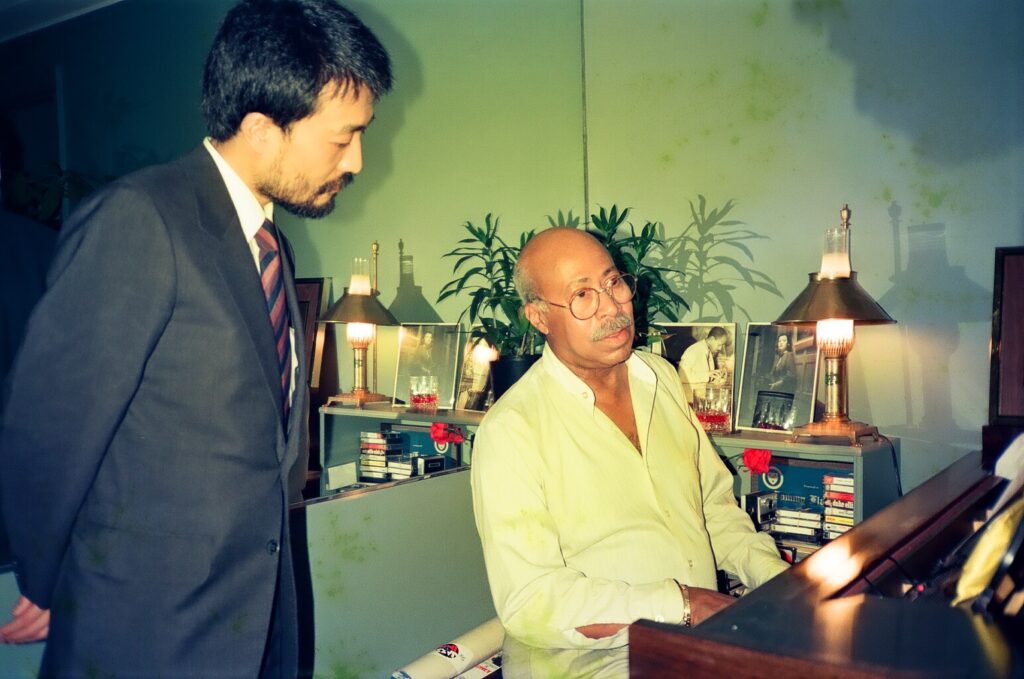
1.That Tired Routine Called Love (Matt Dennis)

ザット・タイヤード・ルーティーン・コールド・ラヴ:フランク・シナトラのヒットソングを数多く作曲したマット・デニス(左写真)は、弾き語りの名手としてTVやラジオでも活躍した。彼はクラブ出演する際、一流ジャズメンをゲストに招くのを好み、それがきっかけで、彼の楽曲はジャズ界に伝承された。J.J.ジョンソンも’55年、高級ナイト・クラブでデニスのショウに出演後、フラナガン参加のアルバム『First Place』 (Columbia, ’57)にこの曲を収録。後にフラナガンはリーダー作《Jazz Poet》 (Timeless/Alfa Jazz, ’89 )に収録し、ライヴでも愛奏、数年後には録音ヴァージョンを凌ぐアレンジが完成した。現在は寺井尚之がそれを引き継ぎ演奏している。
2. With Malice Towards None (Tom McIntosh)
ウィズ・マリス・トワーズ・ノン: フラナガンージョージ・ムラーツ・デ

ュオよる名盤『Ballads&Blues』(Enja ’78)に収録されたスピリチュアルな名作。作曲者のトム・マッキントッシュ(tb)はフラナガンの友人で、この作品の創作過程には、フラナガンのアドバイスが大きく取り入れられた。
「誰にも悪意を向けず」というタイトルは、エイブラハム・リンカーンが、多くの犠牲者を出した南北戦争後の演説の名言だが、今の世界が必要とする言葉かもしれない。
3. A Sleepin’ Bee (Harold Arlen)
スリーピン・ビー:フラナガンが“スプリング・ソング”と呼び、春になると愛奏した演目の一つ。カリブを舞台にしたミュージカル「A House of Flowers」(トルーマン・カポーティ原作、ハロルド・アーレン音楽)の挿入歌。「蜂が手の中で眠ったら、あなたの恋は本物」というハイチの言い伝えを元にしたラブ・ソングだ。フラナガン・ヴァージョンを基に、すっきりと切り詰めた寺井尚之のアレンジをフラナガンは大いに褒めてくれたことがある。
4. They Say It’s Spring (Bob Haymes)
ゼイ・セイ・イッツ・スプリング:
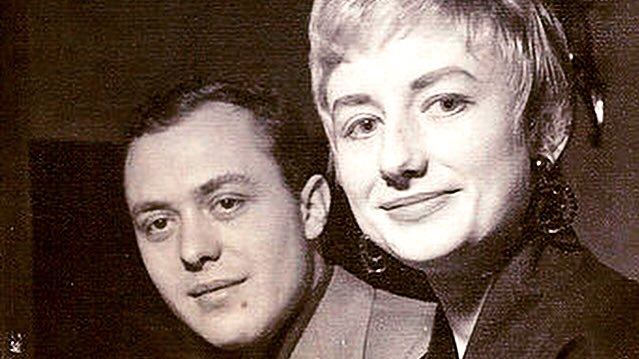
これもフラナガンが愛奏した“スプリング・ソング”で、浮き浮きした春の恋の歌。もともとJ.J.ジョンソン時代のバンド仲間、ボビー・ジャスパーの妻だった歌手、ブロッサム・ディアリーのヒット曲で、フラナガンは彼女のライヴで聞き覚えたという。’70年代にジョージ・ムラーツ(b)との名デュオ・アルバム『Ballads & Blues』に収録している。
5. Passion Flower (Billy Strayhorn)
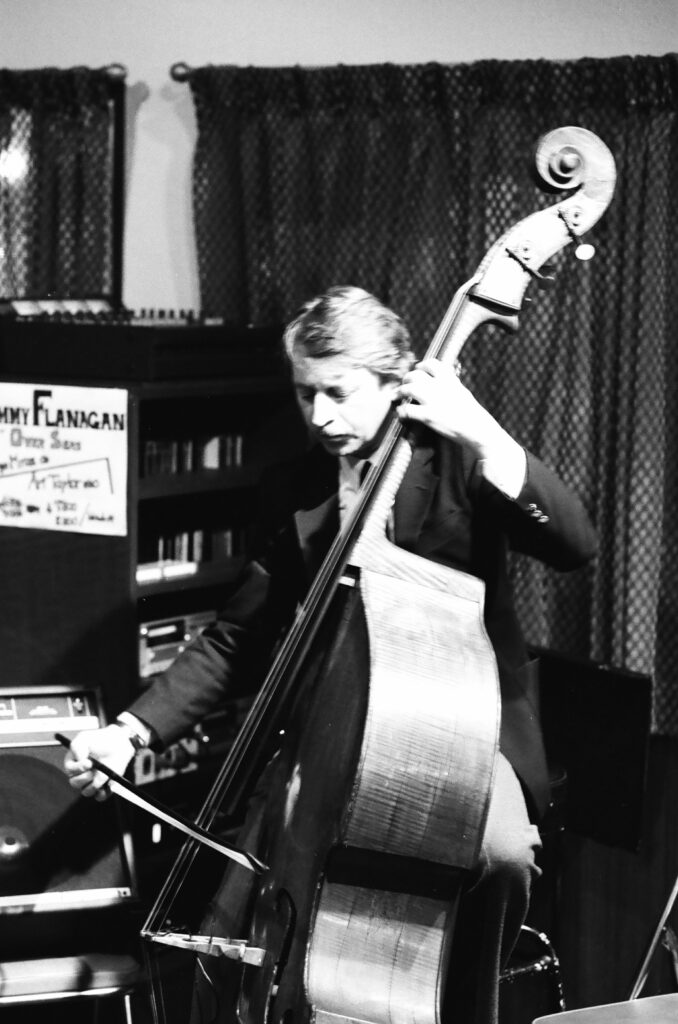
パッション・フラワー:フラナガンが尊敬したビリー・ストレイホーンの作品(’44)で、フラナガン・トリオでは、ベーシスト、ジョージ・ムラーツをフィーチャーする名演目だった。トリビュートでは宮本在浩(b)が年季の入った弓の妙技を聴かせる。パッション・フラワーは日本でトケイソウと呼ばれ、その一風変わった形は、磔刑のキリストに例えられる。ストレイホーンは、黒人のゲイであり、マイノリティとして、常にエリントンの影武者に甘んじた苦悩を、この花に例えたのかもしれない。
ムラーツは独立後もこの曲を愛奏し、リーダー作『My Foolish Heart(’95)』に収録した。
6. Eclypso (Tommy Flanagan)

エクリプソ:フラナガンのオリジナル中、最も人気のあるカリプソ・ムードの作品。寺井尚之がフラナガンの招きで長期NY滞在した最後の夜、《ヴィレッジ・ヴァンガード》で、フラナガンが「ヒサユキのために」とスピーチして演奏してくれた思い出の曲。
7. Easy Living (Ralph Ranger)
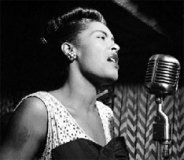
「恋に溺れれば、生きることが楽になる。私の人生はあなただけ」…フラナガンのアイドル、ビリー・ホリディの十八番で、多くのバッパーが演奏した。
フラナガンが亡くなった夜、寺井尚之が涙で鍵盤を濡らしながら演奏した曲だった。24年経った今の寺井のピアノの響きからは、悲しみを越え、音楽の喜びさえ感じられる。
8. Our Delight (Tadd Dameron)

アワー・デライト:ピアニスト、作編曲家、タッド・ダメロン(写真)の作品で、ライヴを盛り上げるラスト・チューンとしてフラナガンが愛奏した。それにもかかわらず、レコーディングはハンク・ジョーンズとのピアノ・デュオしか残されておらず、バップの醍醐味が炸裂するスリリングなフラナガンのアレンジを再現できるのは寺井と宮本在浩しかいない。

1. To You (Thad Jones)
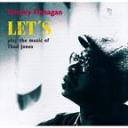
トゥ・ユー:フラナガンのサド・ジョーンズ曲集『Let’s』に収録された美しいバラード、初録音はカウント・ベイシーとデューク・エリントンの二大ビッグバンド唯一の共演盤『First Time! 』(1962)だが、『Let’s』の他の全収録曲がフラナガンがデトロイト時代にジョーンズと演奏したものであることを考えると、おそらくこの作品も同時期の創作と推測される。月の満ち欠けのように位相が変化するサウンドと、余白を生かした独特のリズムが、無駄な装飾を省いた墨絵を思わせるような品格を生み出す。フラナガン譲りのピアノタッチを駆使し、寺井が最近開拓したレパートリーのひとつ。
2. Like Old Times (Thad Jones)
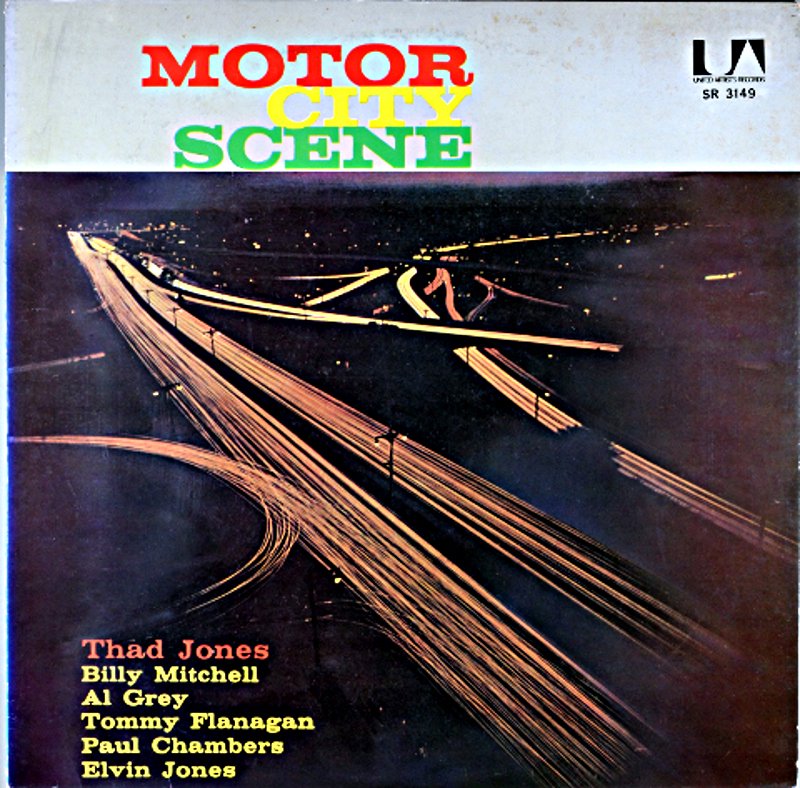
ライク・オールド・タイムズ:これもフラナガンとサド・ジョーンズがデトロイト時代に演奏した作品。ジョーンズ名義の『Motor City Scene』 (’59 United Artist)に収録。後年フラナガンはアンコールに愛奏した。彼がご機嫌なときは、ポケットの中から小さなホイッスルをこっそり取り出し、絶妙なタイミングで、ピューッと吹いて会場を多いに湧かせた。この夜も、寺井が隠し技のホイッスルを鳴らすと、フラナガンが元気だった「昔のように」楽しい空気が満ち溢れた。
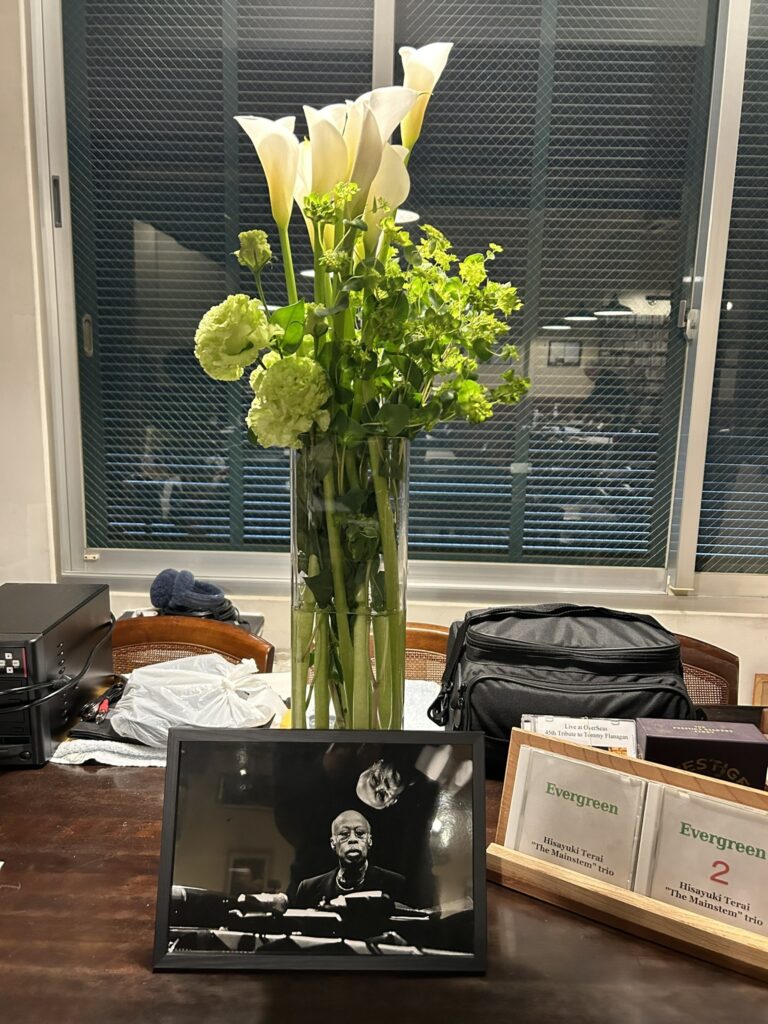
フラナガンが亡くなった直後は、これほど長らくトリビュート・コンサートを続け、多くの方々にフラナガン・ミュージックを楽しんでいただく機会になるとは、想像もしていませんでした。次回のトリビュートは2025年11月15日(土)を予定しています。次回も皆様のお越しをお待ちしています。
今回のコンサート開催にあたり、多くの方々に賜ったご支援に改めて感謝申し上げます。
最後に、これまでチイママとして言葉にできないほど応援してくださったあきちゃんに心からの感謝と祈りを捧げます。
Text by 寺井珠重(てらい たまえ)
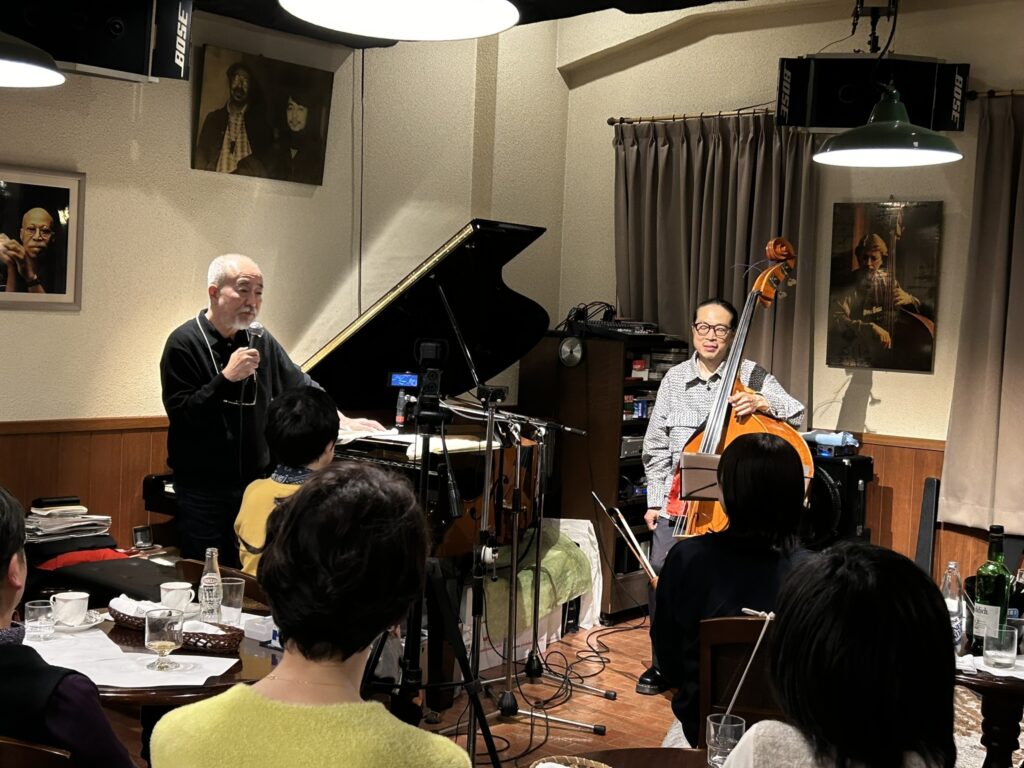

=1st Set=
1. 50-21 (Thad Jones)
2, Beyond the Blue Bird (Tommy Flanagan)
3. Medley: Embraceable You (George Gershwin) – Quasimodo (Charlie Parker)
4. Minor Mishap (Tommy Flanagan)
5. Sunset and the Mockingbird (Duke Ellington, Billy Strayhorn)
6. Beats Up (Tommy Flanagan)
7. Dalarna (Tommy Flanagan)
8. Tin Tin Deo (Chano Pozo, Gill Fuller, Dizzy Gillespie)
=2nd Set=
1.That Tired Routine Called Love (Matt Dennis)
2. With Malice Towards None (Tom McIntosh)
3. A Sleepin’ Bee (Harold Arlen)
4. They Say It’s Spring (Bob Haymes)
5. Passion Flower (Billy Strayhorn)
6. Eclypso (Tommy Flanagan)
7. Easy Living (Ralph Ranger)
8. Our Delight (Tadd Dameron)
Encore
1. To You (Thad Jones)
2. Like Old Times (Thad Jones)

3/10(月)寺井尚之ジャズピアノ&理論教室
3/11 (火) 寺井尚之(p)+橋本洋佑(b)デュオ Live Charge 2200 *Music 7pm-/ 8pm-(入替なし)
3/12(水) 寺井尚之(p)+ 宮本在浩(b)デュオ Live Charge 2530 *Music 7pm-/ 8pm-/ 9pm-(入替なし)
3/13(木)寺井尚之ジャズピアノ&理論教室
3/14 (金) 荒崎英一郎(ts)トリオ w/寺井尚之(p)、橋本洋佑(b) Live Charge 2530 *Music 7pm-/ 8pm-/ 9pm-(入替なし)
3/15(土)The 46th “Tribute to Tommy Flanagan” Concert
* Music 7pm-/ 8:20pm- (入替なし) 前売 3850(税込)

3月恒例のトミー・フラナガン・トリビュートは、フラナガンの誕生日前日に開催します。(*English below)
前売りチケットは当店のみで販売中です。お早めにお求めください。
演奏:寺井尚之-piano, 宮本在浩-bass
日時:2025年3月15日(土) 7pm-/8:20pm(開場6pm 入替なし)
前売りチケット¥3850(税込 座席指定)
席数が限られています。お早めにお求めください。
=Annual Concert tribute to Tommy Flanagan in March 2025=
This year of 2025, pianist and owner of Jazz Club OverSeas, Hisayuki Terai with Zaiko Miyamoto on bass will hold his special tribute concert to his mentor, Tommy Flanagan.
Date and Time:
Saturday, March 15, 2025
7:00 PM / 8:20 PM (Doors open at 6:00 PM, no seat changes between shows)
Advance Ticket Price: ¥3,850 (tax included, reserved seating)
Seats are limited, so please purchase your tickets as soon as possible.